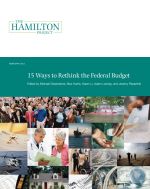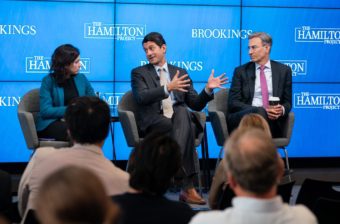Few policy debates have been as contentious as the current tug-of-war over the federal budget deficit. Despite widespread agreement that the budget is on an unsustainable path, there is also widespread disagreement about what should be done, and, to complicate matters, this budgetary uncertainty comes at a time when policymakers are still trying to get Americans back to work in the wake of the Great Recession.
In the coming months, policymakers will make important decisions on how to reduce the budget deficit. These decisions pose significant political and economic challenges, but also create a rare window of opportunity for policymakers to decide what kinds of programs and investments our country values, and what sort of society we will create for future generations. Once consensus has been reached about the broad focus of future investments, the devil will be in the details of implementation. And without a doubt, a sound budget strategy will require ideas rooted in evidence, not ideology, if we are to achieve these long-term goals.
To this end, The Hamilton Project asked leading experts from a variety of backgrounds—the policy world, academia, and the private sector, and from both sides of the political aisle—to develop policy proposals that could form a partial menu of options to achieve responsible deficit reduction. These experts include Jonathan Gruber, an MIT professor who was instrumental in shaping health-care reform bills in Massachusetts and nationally; Jeff Liebman, a Harvard professor who previously served as acting Deputy Director at the Office of Management and Budget; Gary Roughead, a retired four-star admiral and former Chief of Naval Operations; Tyler Duvall, former Assistant Secretary of Transportation Policy at the Department of Transportation; Adele Morris of Brookings, who leads the institution’s climate and energy economics initiative; and many others.
The mandate given to the authors was to describe pragmatic, evidenced-based proposals that would both reduce the deficit and also bring broader economic benefits. The resulting fifteen proposals take on a wide-ranging set of topics, including immigration, transportation, health care, defense spending, and tax expenditures, and include options to reduce mandatory and discretionary expenditures, raise revenues, and improve government efficiency.

The opening table of The Hamilton Project’s forthcoming budget book presents the fifteen proposals and their potential impacts on the economy and the deficit over a ten-year period. Viewed individually, the proposals offer specific reforms and evidence-based policy ideas to achieve budgetary savings and broader economic benefits. Taken together, they offer a menu of policies—a mix of tax reforms, changes to major spending programs, and new revenue raisers—that could contribute meaningful deficit reduction and help the country confront its most pressing economic challenges. To preview the budget table, click here.
The Hamilton Project budget report will be released on February 26th as part of a two-part forum:
Part I: Budgeting for a Modern Military — February 22nd
The first event will feature two proposals for reducing defense spending while preserving national security. The authors of the papers—Retired Admiral and former Chief of Naval Operations Gary Roughead, and former CBO Assistant Director Cindy Williams—will be joined to discuss their ideas by high-level experts including former Deputy Secretary of Defense and former CIA Director John Deutch, former Undersecretary for Defense Michele Flournoy, and former Senate Armed Services Chairman Sam Nunn.
Part II: Addressing Entitlements, Taxation, and Revenues — February 26th
The second event in our series will shift the focus to entitlements, tax reform, and new sources of revenue. Three former CBO directors—Alice Rivlin, Senior Fellow at Brookings, Robert B. Reischauer of The Urban Institute, and Donald Marron of the Tax Policy Center—will set the stage for the day’s discussions around 13 new proposals for reducing the deficit. A diverse group of authors will join the forum for roundtables focusing on an enduring social safety net, innovative approaches to tax reform, and new sources of revenue and efficiency.
On a related note, we recently sat down to discuss some of the insightful ideas that will be presented. Watch a video of that discussion here.
For updates on the event, follow us @hamiltonproj and join the conversation using #RethinktheBudget.



